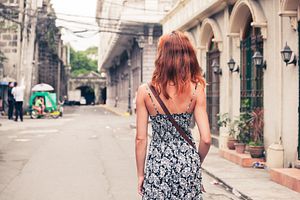Whether it is in urban or rural areas, in developed or developing countries, sexual harassment and other forms of sexual violence in public spaces are everyday episodes for women and girls around the world.
“I’ve been asked for my name and number by strangers. When I notice a group of men on the street and I am about to pass them, I get scared. I make a turn to avoid them. Even if it means taking a longer walk going home. I also get scared of our community because a lot of fights happen there. So I rarely leave the house,” a young girl in secondary school from Quezon City, Philippines shared.
She is one of the millions of women globally that fear for their safety when leaving home. As UN Women puts it, women and girls fear and experience different kinds of sexual violence in public spaces, from cat calls and unwanted touching, to rape and femicide. This universal issue happens on streets, in and around public transportation, schools and workplaces, public toilets, water distribution sites, and parks in urban, rural, and conflict or post-conflict settings.
Women in economically progressive regions are not exempt from public harassment. Twenty percent of women have reported experiencing sexualized violence in public spaces, according to a 2014 survey conducted by the U.S.-based nonprofit organization Stop Street Harassment. It also reported that 43 percent of young women in London claimed they had experienced it during 2012 alone.
UN Women data also show that women’s fear of sexual harassment and sexualized violence forced restrictions on their freedom and activities. Women live in fear of being unsafe outside the home during the day and at night, stopping them from going to school among other things.
This reality is not just about short-term restrictions on activities; it is also about long-term barriers on opportunities and services, as Women Under Siege Project wrote. Close to being treated as second-class citizens, women have a hard time accessing the same rights and privileges that men have. Safely participating in public life, and enjoying recreation opportunities are not easy tasks for women, and the stress and inequality negatively impacts their health and well-being.
Free from Fear
In response to this, UN Women has launched the Safe Cities Global Initiative. It has two flagship programs. There is the Safe Cities Free of Violence against Women and Girls which is active in Ecuador, Egypt, India, Papua New Guinea and, Rwanda. The other is the Safe and Sustainable Cities for All joint program with UNICEF, and UN-Habitat. It runs in Brazil, Costa Rica, Honduras, Kenya, Lebanon, Morocco, Philippines, and Tajikistan.
The first of its kind, the global comparative program encompasses plans, tools, policies and comprehensive approaches that mitigate dangers for women when they are out in public spaces. It works on the prevention of sexual harassment and violence against women and girls across different settings. When the unfortunate happen, the program also includes the response for the situation.
Most recently, Quezon City became a part of the Safe Cities and Safe Public Spaces Global Initiative. Quezon City has around 3 million inhabitants, with one of the highest rates of urban poverty and number of informal settler families. Some areas in the city have been unsafe due to high levels of poverty, unemployment, drug use, trafficking, and robberies. Women and girls, in particular, have been under the danger of sexual harassment in many of city’s public spaces. For example, male perpetrators often grab and grope women during robberies.
“What I like about this program with UN Women is that now we are reviewing our local policy and updating it to make it more attuned with the times, making public harassment also a crime that should be penalized,” Aldrin Cunha, Quezon City Administrator, stated.
Taking Quezon City under the initiative means that the people behind the program are committed to conduct a scoping study, to collect information about sexual violence against women and girls, in public spaces in two local areas: Bagong Silangan and the Payatas.
UN Women Around the World
“During each of my meetings with UN Women, our mission was clearly articulated to raise awareness of the needs of disenfranchised women and to increase funding to support UN Women initiatives,” said Lalita Janke, the board president of the US National Committee for UN Women.
Janke has been working with battered women and setting up programs for them since the 1980s. Together with her husband, she has also created the Walter and Lalita Janke Charitable Foundation to help eradicate the use of violence and abuse, especially on women, to resolve conflicts. Change that is substantive, sustainable and irreversible is Janke’s goal.
“To accomplish this change, we need to be committed to revitalizing and reinventing ways to gain support. By collaborating and encouraging like-minded people and organizations to join us in our mission, we can collectively and universally, work to implement the newly crafted sustainable developmental goals,” she added.
Human rights violations now include domestic violence, hitherto widely ignored. Yet the abuse and violence, especially sexual harassment, that women and girls experience in public spaces remains a largely neglected issue. The key to solving this lies in empowering women, giving them the tools and opportunities needed to participate in cities’ decision making. With women at the helm looking at the cities’ spaces, women’s realities can be seen more clearly, such that better, safer, and more liberating solutions can follow.
Angelique Moss is a London-based writer.

































